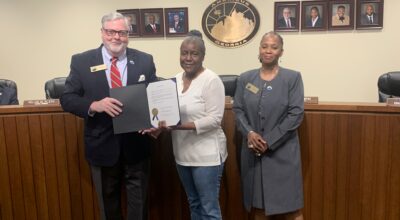City Council holds lengthy work session
Published 10:07 am Thursday, August 22, 2019
|
Getting your Trinity Audio player ready...
|
By Beth Alston
AMERICUS — The Americus mayor and city council held a two and half hour open work session Thursday prior to voting to go behind closed doors to discuss “personnel and pending litigation.”
Among visitors who spoke at the meeting was Bill Harris Jr., representing Sumter Cycling, who gave a presentation, along with two others, Jill Honeker and John Morgan, on proposed bike paths/lanes. There is $920,000 available from the 2014 SPLOST allocated to this purpose and the project must be started in 2020.
Dee Jones, the city’s human resources director, gave mayor and council a compensation plan update. As part of the compensation study recommendations approved in August 2018, by council, there will also be merit increases of 4 percent for each department’s payroll for merit increases of between 3 and 5 percent for employees, based on performance, and an across the board cost of living increase. These increases will have to be factored into the budget for 2020.
Jones said if the city doesn’t fund these increases, that it will fall behind again in competing with other communities for good employees and again experience shortages in the fire and police departments. She also talked about the early retirement incentive program for city employees, which she said, in the long run, has had a positive financial impact on the city as well as boosting morale.
A long discussion by the mayor, council, and finance director, and city manager centered on the 2019 mid-year financial analysis, setting the 2019 millage rate, and the calendar for budget meetings and public hearings.
City Manager Charles Coney provided a handout outlining budget cuts and various scenarios of funding at different millage rates prepared by Diadra Powell, city finance director.
Coney said the deficit is now at less than $600,000 and there have been meetings with department heads to cut 10 percent from budgets and there has been “cooperation among departments.” Council member Lou Chase, who was absent last month when the shortfall was discussed, asked about expenditure coding by department heads to ensure there will be no more discrepancies. Powell said that documentation will keep this from happening again and that purchase orders and proposals will have the same coding. Coney said they’ve had to kick back several expenditures because the signatures were not correct. He said “multiple levels of oversight” will be in place and any problems will be cleared up with department heads.
Mayor Barry Blount said the YTD expenditures are approximately $588,000 short, and last year’s anticipated millage rate was 11.32. “Our choice is to cut some more or raise the millage rate. We don’t have a deficit, but if we’re going to maintain the budget for the rest of the year, there will have to be a change.”
Powell stressed that there are projections to balance the General Fund. Coney commented that every government he knows has to do a year-end projection. The mayor said he was “amused” by comments he had read on Facebook, saying the city had moved money from the water and sewer funds to the General Fund. “That is ludicrous,” he said. “The salary increases would bump it up to 14.09 mills. That’s how we got to where we are, basically.”
The discussion continued with Powell saying that based on a gross digest of $328,705.054 (real and personal property), the value of one mill is $317,027. This is based on a calculated millage rate of 11.33 (the actual 2018 millage rate was 10.92). This represents a 3.75 percent increase over actual 2018. The property tax at 11.33 mills is $3,591,916 and revenue-expense, adjusted for the 2019 gap, comes to $569,362.
Powell gave different projections based on millage rates of 13.12, 14.00, 14.05, and 14.30. At the 14.05 rate, each mill would generate $435,614, representing a 32.78 percent increase from the actual 2018.
Powell also showed a tax billing analysis at the 2019 millage rate of 11.33 compared to prior year. For example, a house valued at $500,000, and taxed at 50 percent value, would be taxed at $103 more for 2019 than 2018, representing at 3.75 percent increase. She did this for all the different millage rates, all the way to 14.50 mills which represents a 32.78 percent increase in taxes on a house valued at $500,000.
The mayor offered, “Last year when we voted (on salary increases), we said it would be 14.05. Rather than nickle and diming ourselves, let’s go ahead and bite the bullet and carry us over to next year and maybe we won’t have to have another increase then. If we have to do the merit and cost of living increases next year, this will just give us a leg up on some funding. Nobody likes to pay taxes. I don’t either. But if we’re going to have quality services and employees, we have to pay for it. We can’t go back on what we voted on last August.”
Council member Juanita Wilson asked if they had to make a decision before they looked at the budget numbers. Blount said the millage rate has to be determined by September before they can talk about next year’s budget.
On the consent agenda for Thursday’s regular meeting at 6 p.m. are the following.
- Approve a resolution supporting GMA and other cities advocating opposition to House Bill 302 which prohibits cities and counties from regulating residential building design elements.
- Accept bid for a new backhoe for Waste Water Treatment Plant.
- Accept bid for reuse pump for Waste Water Treatment Plant.
On the agenda for Thursday are the following.
- Consider a proposal from HEAT which helps low-income households with energy bills during winter months.
- Consider a proposal from Croy Engineering for the re-striping of Lamar Street.





